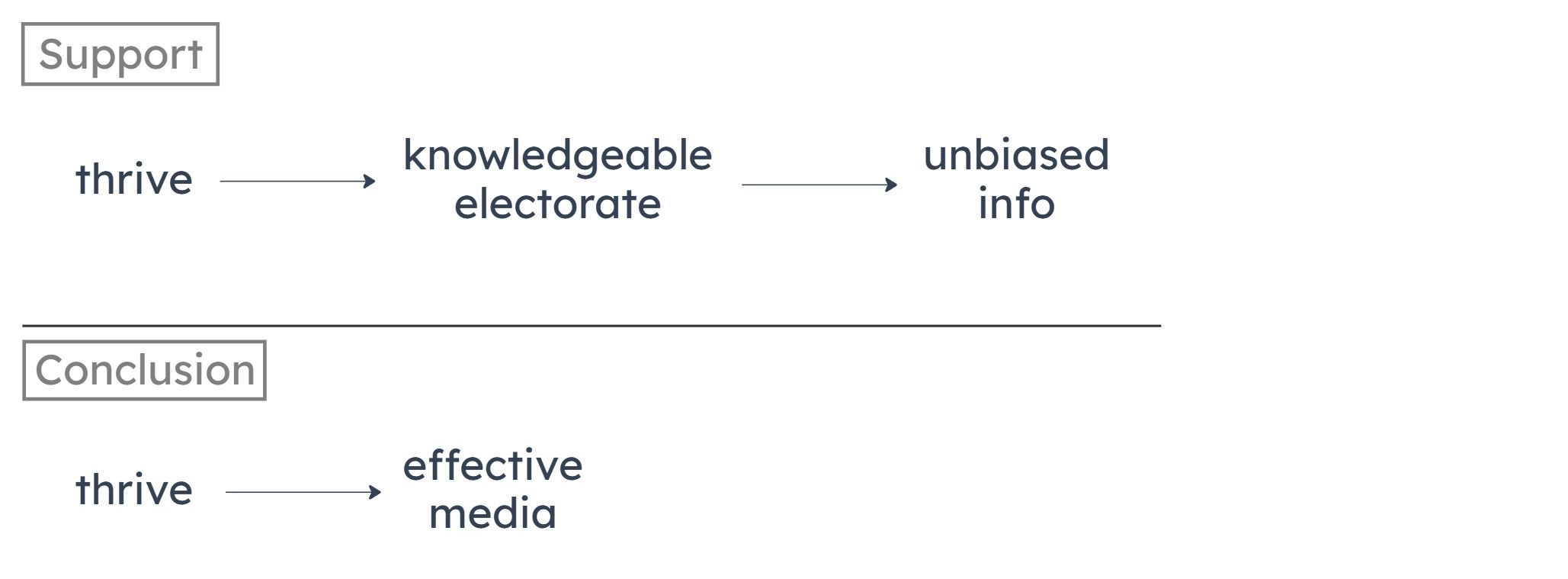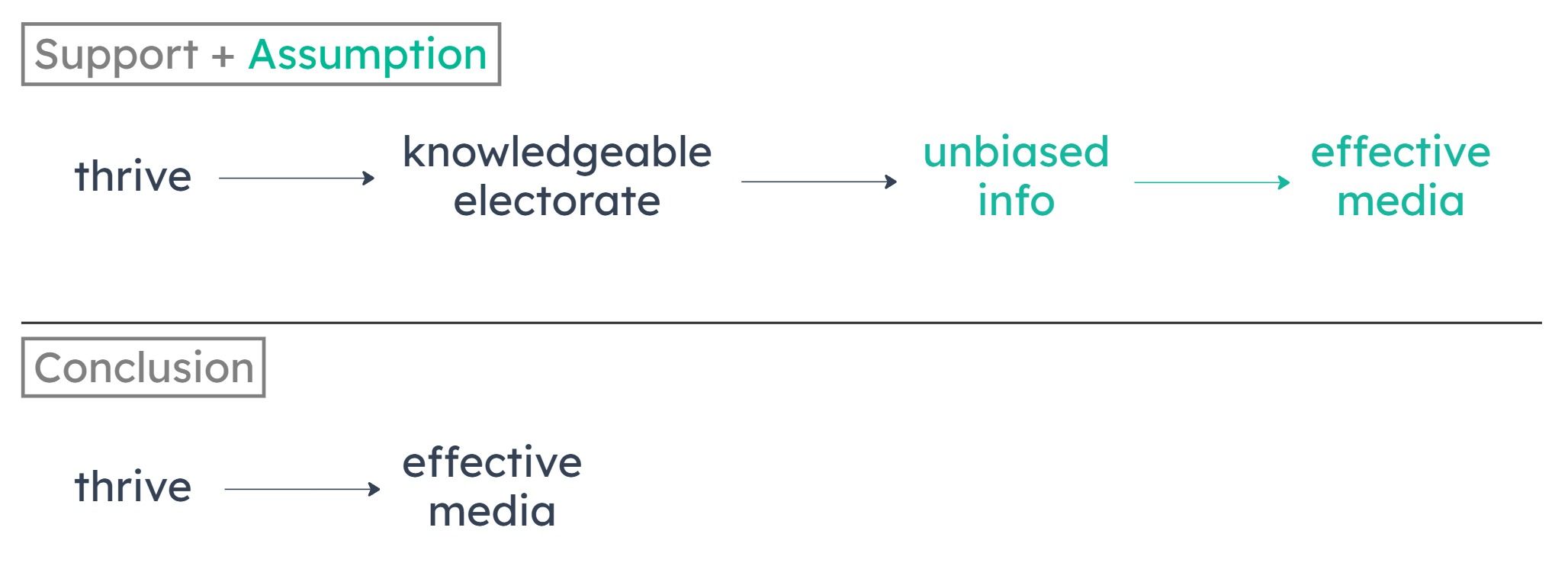LSAT 141 – Section 4 – Question 24
LSAT 141 - Section 4 - Question 24
September 2014You need a full course to see this video. Enroll now and get started in less than a minute.
Target time: 0:59
This is question data from the 7Sage LSAT Scorer. You can score your LSATs, track your results, and analyze your performance with pretty charts and vital statistics - all with a Free Account ← sign up in less than 10 seconds
| Question QuickView |
Type | Tags | Answer Choices |
Curve | Question Difficulty |
Psg/Game/S Difficulty |
Explanation |
|---|---|---|---|---|---|---|---|
| PT141 S4 Q24 |
+LR
| Sufficient assumption +SA Conditional Reasoning +CondR Link Assumption +LinkA | A
2%
153
B
8%
156
C
5%
155
D
7%
156
E
79%
165
|
145 152 160 |
+Medium | 147.542 +SubsectionMedium |
J.Y.’s explanation
You need a full course to see this video. Enroll now and get started in less than a minute.
Summary
The author concludes that in order for a democracy to thrive, there must be effective news media. This is based on the following:
In order for a democracy to thrive, it must have an electorate that is knowledgeable about important political issues. And in order for an electorate to be knowledgeable about important political issues, it must have access to unbiased info about the government.
In order for a democracy to thrive, it must have an electorate that is knowledgeable about important political issues. And in order for an electorate to be knowledgeable about important political issues, it must have access to unbiased info about the government.

Missing Connection
We know from the premises that in order for a democracy to thrive, the electorate must have access to unbiased info about the government. But the conclusion jumps to the claim that we need “effective news media” for a democracy to thrive. We don’t know anything about “effective news media” is required for from the premises. So we want to add a claim that establishes that in order for an electorate to get unbiased info about the government, there must be effective news media.
A
All societies that have effective news media are thriving democracies.
(A) establishes that societies with effective news media have thriving democracies. But this doesn’t imply that in order to be a thriving democracy, it’s necessary to have effective news media. So (A) doesn’t guarantee the conclusion.
B
If an electorate has access to unbiased information about the government, then that electorate will be knowledgeable about important political issues.
(B) doesn’t say anything about what effective news media is required for. Since the premises also don’t say anything about that, there’s no way that (B), in connection with the premises, could prove a conclusion concerning what effective news media is required for.
C
A democracy will thrive if its electorate is knowledgeable about important political issues.
(C) doesn’t say anything about what effective news media is required for. Since the premises also don’t say anything about that, there’s no way that (C), in connection with the premises, could prove a conclusion concerning what effective news media is required for.
D
A democracy cannot thrive if the electorate is exposed to biased information about the government.
(D) doesn’t say anything about what effective news media is required for. Since the premises also don’t say anything about that, there’s no way that (D), in connection with the premises, could prove a conclusion concerning what effective news media is required for.
E
Without effective news media, an electorate will not have access to unbiased information about the government.
(E) establishes that effective news media is necessary for an electorate to have access to unbiased info about the government. In connection with the premises, this proves that an effective news media is necessary for a thriving democracy.

Take PrepTest
Review Results
LSAT PrepTest 141 Explanations
Section 1 - Reading Comprehension
- Passage 1 – Passage
- Passage 1 – Questions
- Passage 2 – Passage
- Passage 2 – Questions
- Passage 3 – Passage
- Passage 3 – Questions
- Passage 4 – Passage
- Passage 4 – Questions
Section 2 - Logical Reasoning
- Question 01
- Question 02
- Question 03
- Question 04
- Question 05
- Question 06
- Question 07
- Question 08
- Question 09
- Question 10
- Question 11
- Question 12
- Question 13
- Question 14
- Question 15
- Question 16
- Question 17
- Question 18
- Question 19
- Question 20
- Question 21
- Question 22
- Question 23
- Question 24
- Question 25
Section 3 - Reading Comprehension
- Passage 1 – Passage
- Passage 1 – Questions
- Passage 2 – Passage
- Passage 2 – Questions
- Passage 3 – Passage
- Passage 3 – Questions
- Passage 4 – Passage
- Passage 4 – Questions
Section 4 - Logical Reasoning
- Question 01
- Question 02
- Question 03
- Question 04
- Question 05
- Question 06
- Question 07
- Question 08
- Question 09
- Question 10
- Question 11
- Question 12
- Question 13
- Question 14
- Question 15
- Question 16
- Question 17
- Question 18
- Question 19
- Question 20
- Question 21
- Question 22
- Question 23
- Question 24
- Question 25
- Question 26
Leave a Reply
You must be logged in to post a comment. You can get a free account here.